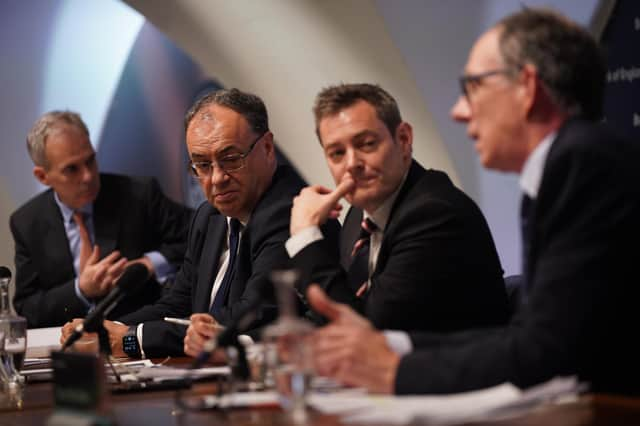Largest interest rate hike in decades a ‘cruel necessity’


Dr Esmond Birnie was commenting on Thursday after the Bank of England’s Monetary Policy Committee (MPC) raised the base rate from 1.25% to 1.75%.
The decision has been taken in response to forecasts that rising energy costs will push the UK economy into a recession that will last throughout 2023.
Advertisement
Hide AdAdvertisement
Hide Ad“Growth thereafter is very weak by historical standards,” the Bank also said.
The dire economic conditions will see real household incomes drop for two years in a row, the first time this has happened since records began in the 1960s. They will drop by 1.5% this year and 2.25% next. However, the recession will at least be shallower than the 2008 crash, with GDP dropping up to 2.1% from its highest point.
Bank officials said that the depth of the drop is more comparable to the recession in the early 1990s. Unemployment will start to rise again next year, according to the projections. The Bank said that it expects inflation to come back under control in 2023, dropping below 2% towards the end of the year.
Dr Birnie, senior economist at Ulster University’s Business School, said the 0.5% rate hike was “widely expected”.
Advertisement
Hide AdAdvertisement
Hide AdHe said: “Household borrowers are hurt, especially those on variable or tracker mortgages (roughly one-third of all mortgages in NI).
“Even government will find they have to pay £billions extra in terms of interest on the now enormous public debt. And all this in a context where the Bank of England is predicting that this year the average spend on fuel and heating by a UK household will be £3,500: several times higher than what it was before the Russian invasion of the Ukraine.”
Dr Birnie added: “Admittedly, there may be some gains to those with saving accounts but expect the increase in those rates to be low. If it is all so painful, why increase rates, and especially important question given that the Bank is also now predicting a UK recession starting in October 2022 and continuing throughout all of 2023 (in terms of duration- a major recession)?
“Two reasons (if anything it would have been better if the rates rise had started earlier but we are we are): First, higher UK interest rates may help to prop up the pound sterling against foreign currencies (especially the US dollar). That helps to limit the increase in import prices (especially oil- priced in US dollars).
Advertisement
Hide AdAdvertisement
Hide Ad“Second, the Bank’s rates decision is an important sign to the rest of us that they are taking inflation seriously. That they are determined we are not going back to the future in the sense of re-living the sort of energy price - wage spirals which marked the 1970s.”
The economist went on to say: “More practically, the higher rates place a squeeze on businesses to try to control and limit very high wage increases.”
The MPC said: “The UK is now projected to enter recession from the fourth quarter of this year. Real household post-tax income is projected to fall sharply in 2022 and 2023, while consumption growth turns negative.”